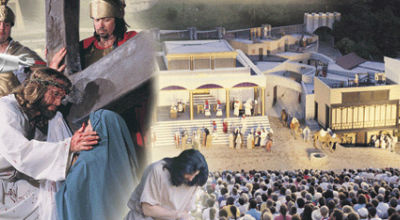Resurrection Miracle: ‘Great Passion Play’ Lives Again
Last December, the Great Passion Play in Eureka Springs, Ark., ended its 45-year run, unable to stave off a $75,000 creditor demand to prevent foreclosure. Animals and fixtures in the show were sold in order to meet the debt obligation. It appeared as though the theater in hilly, forested northwest Arkansas, once the nation’s most popular outdoor drama, would be no more.
Then Randall Christy, founder of The Gospel Station Network, mobilized listeners, who raised the money necessary to give the Passion Play new life.
“It’s one of the greatest Christian icons in the world,” says Christy, who founded the 25-station Ada, Oklahoma-based radio network 15 years ago. “It seemed such a shame that Christians would allow it to go away.”
In 10 days, Christy spearheaded a drive to raise $75,000 to keep the play viable. Many $10 and $20 donations poured in, and no contribution exceeded $5,000.
The former Great Passion Play board of directors resigned, and Christy, 48, took over as CEO. The Gospel Station Network is the new producer of the play, which is still owned by the Elna M. Smith Foundation.
Christy felt an instant rapport with Church on the Hill Assembly of God (Berryville, Ark.) Pastor Keith Butler, and asked him to remain as the only holdover from the former eight-member board. Butler, who has been involved with the play for more than two decades, now has a more active daily role in management as chief administrator, as well as chair of the reconstituted three-person board.
“It is absolutely a modern-day miracle,” Butler, 62, says about the show’s revival. “It went right down to the last possible moment, and then the community and the region stepped up.”
Christy and Butler, along with Butler’s son, Kent, the new assistant executive director of the Great Passion Play, have set a direction for the 1-hour-and-45-minute drama. They are marketing the play more aggressively and proactively seeking major donors.
One new fundraising plan is to offer churches and individuals the opportunity to dedicate one of the amphitheater’s 4,100 seats with a memorial name plaque for $250.
This spring, volunteers have been cleaning, painting and repairing the theater. Churches have brought youth groups. Senior citizen campers have donated time. Gospel music artist Jason Crabb performed in a benefit concert. Farmers and ranchers have bequeathed horses, donkeys, camels and other animals.
Performers, in an effort to get the six-month season under way in May, agreed to volunteer their time until ticket sales generated income. The actors typically receive a nominal fee.
Since it opened in 1968, more than 7.6 million people have watched the Great Passion Play, which depicts the last week of Christ’s life on earth, including the Crucifixion and the Ascension. Attendance peaked at 289,212 in 1992, but dwindled to 46,578 last year.
A precipitous decline began five years ago with the economic downturn and rising gas prices. As a result of an extensive analysis by Kent Butler, ticket prices for the Great Passion Play have decreased to try to get more people through the turnstiles. There also will be 80 performances this year compared to 110 in 2012 in an effort to eliminate the lowest-attended dates.
“By the leading of the Holy Spirit, we want to make sure we are making better business decisions,” says Butler, who also is children’s pastor at Church on the Hill. “We’re both a business and a ministry, but we have to take better care of our business to do ministry.”
Butler says seeing the suffering and resurrection of Christ at the Great Passion Play as a 5-year-old Royal Ranger helped him grasp the veracity of the gospel. Now 24, Butler has performed in the play for eight years.
“I turned 16, got my driver’s license, and became a Roman soldier,” he remembers. He graduated to the role of Judas Iscariot, and now is one of three players who rotate as Jesus Christ. Butler’s wife, Mallory, has been in the play since depicting a lame girl at age 5. Today, she acts as Mary Magdalene. Her father, Rick Mann, spent years portraying Jesus.
Altogether, the show features approximately 160 actors from a multitude of congregations. Some are retirees; others have full-time jobs. The Great Passion Play has a $2 million annual operating budget, which covers everything from feeding animals to lighting the amphitheater.
Around 40 of the actors attend Church on the Hill Assembly of God, representing roughly one-tenth of the church’s attendees.
“We look at it as an outreach ministry of our church,” says Keith Butler, who has been pastor of Church on the Hill for 32 years. “I believe in the ministry thrust of the Great Passion Play as a spectacular demonstration of the greatest historical event ever. The testimonies we receive back from people who attend indicate the play makes a significant impact on their spiritual walk.”
Butler himself sensed an array of emotions the first night he witnessed his son being flogged while portraying Jesus.
“It gave me a whole new understanding of what God the Father must have felt when He saw His Son beaten,” Butler says.
Kent Butler hopes enough sponsors step up to keep the play from returning to the brink of extinction. He says a $2.5 million debt load remains. As part of the complex, a Bible museum contains more than 6,000 Bibles in 625 languages and dialects. Butler says while the corporation doesn’t want to sell rare and valuable Scripture texts, collectors would be interested if the play doesn’t emerge from financial doldrums.
“In a world with so much pain and sorrow, we need this play to show people hope,” Butler says. “We pray that people come this year as they feel led by the Holy Spirit to renew their Christian faith.”
This article was originally published in Pentecostal Evangel.














































